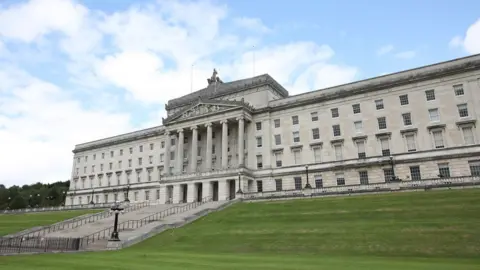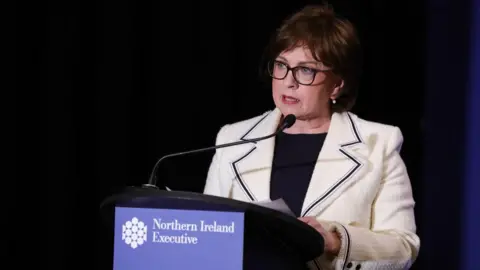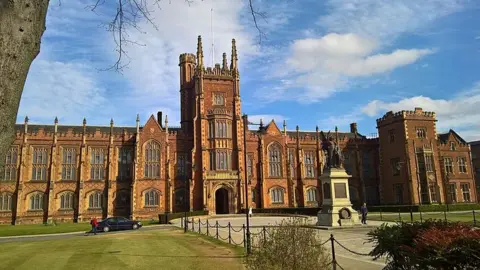Coronavirus: Executive faces 'difficult economic decisions'
 PA Media
PA MediaThe NI Executive has "difficult decisions" to take in the coming weeks regarding economic recovery from Covid-19, a senior civil servant has said.
Some financial support from the UK Treasury is due to end in October.
NI's Department for the Economy said it is a "conservative estimate" that there could be more than 100,000 unemployment claimants by the end of 2020.
Its permanent secretary Mike Brennan warned the full impact of the crisis has not yet begun.
Appearing before Stormont's Economy Committee on Wednesday, Mr Brennan said almost 330,000 workers in Northern Ireland are currently receiving some sort of income support from London.
He said almost 250,000 people had been furloughed, while about another 80,000 people were on the Treasury's support scheme for the self-employed.
"Those schemes start to taper out from the end of this month (August), and will end in October," said Mr Brennan.
"If you turn off the tap, a large cohort will go straight to unemployment".
 PA Media
PA MediaThe department's official said those schemes had been used to keep some businesses on "life support", but that the Stormont Executive now needed to make decisions about where to deliver additional funding heading into the autumn months.
He told the committee that the Department for the Economy had identified a number of areas in which to allocate funding, as a result of a previous underspend meaning some cash had returned to a pot given to the executive in July.
He said it was his understanding that the Finance Minister Conor Murphy wanted a paper to consider in September that would bring together various aspects of the executive's recovery plans.
'Significant pressure'
The department wanted to target funding towards innovation and skills, as well as the social economy - childcare, the taxi and coach sector and tourism, he added.
"We are under significant pressure, the willingness is there but it's now the timing of what we do," said Mr Brennan.
"To be blunt - we know what we need to do, we know how much money there is but we just need to get on and start doing things, rather than having discussions about it".
Economy Minister Diane Dodds, who also appeared before the committee, said her department was developing proposals to increase demand, and said a tourism voucher scheme to support hotels and B&Bs during the autumn was one possibility.
She also faced questions from assembly members about the department's plans to support additional university places for students in Northern Ireland this year, following the changes to A-level grades.
 Creative Commons
Creative CommonsThe Northern Ireland Executive controls the number of undergraduate places available at Queen's and Ulster University for students from Northern Ireland.
The Department for the Economy then sets a maximum aggregate student numbers (MaSN) cap at both universities based on financial calculations.
Queen's University Belfast had warned they may need between 500 to 1,000 extra places to admit all affected students, at a cost of about £4,000 per student.
Additional places needed
Mrs Dodds said the executive had agreed to provide "whatever funds are necessary" in order to facilitate all prospective university students in NI.
She said her department had costed the plans - and although she did not detail how much it would cost - she said the support was necessary due to an "exceptional year".
"There is a need for additional places in medicine - some young people may even have to defer because of a capacity issue for actual teaching of the course," added the minister.
"There are still ongoing challenges, clearing is still in full swing - but we need to retain talent.
"This won't just be additional support for now but for the length of the three, four or five years these young people are in education".
